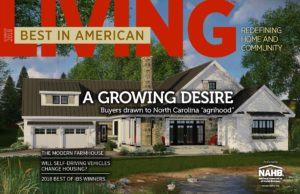What should communities do with older buildings have outlived their original purpose? Office complexes, churches, shopping malls, schools, and more each can have a time when their original use is no longer needed. For many of these buildings, adaptive reuse is a natural choice.
Whether preserving historic features, or simply making a more efficient use of materials with rehabilitation, adaptive reuse offers a valuable opportunity to revitalize these spaces. Retaining the use of materials such as seasoned timber and old brick also can help to achieve sustainability and preserve architectural memory.
Preserving and Revitalizing Neighborhoods
Adaptive reuse projects often convert former commercial and industrial properties to new multifamily residential. The 2019 Best in American Living Awards recognized two outstanding multifamily residential conversion projects in Houston, Texas, and Washington, D.C.
Bell Heights in Houston is 1714 Ashland, LLC’s redevelopment of a 1959 Southwestern Bell switching station and Telephone Museum. The 44 units include 24 lofts and an additional 20 cottages on the 1.6-acre property with ample restaurants and shopping nearby.
Designed by Mirador Group and developed by 1714 Ashland, LLC, each Bell Heights loft unit includes features such as 12-foot exposed concrete ceilings, brick- wrapped columns, floor-to-ceiling windows, balconies, custom cabinetry, and more. Amenities include a fitness room and 10,000 square-foot rooftop terrace with sweeping views of Houston’s downtown skyline.
The building was originally constructed with a basement with 12-foot ceilings. The developer converted the basement into a 50-car parking garage that provided two spaces and extra storage for every loft unit, plus bike storage.





Bell Heights, photography by Rob Muir Photo, EmoMedia, and Charles Suman. Visit the photo gallery to see all project photos.
In Washington, DC, Linden Court is a mixed-use residential and retail project behind the Atlas Theater in the H Street neighborhood. Originally developed as ten rowhomes, in the 1940’s, six of these were combined and converted into commercial property.
In 2015, Monarch Urban acquired the Linden Court property for redevelopment. There are now four three-bedroom, three-bath townhomes with backyards and garages, plus private roof decks with views of Capitol Hill. The development also includes a unique live/work space with ground-floor retail and an apartment above.
Revisioning the Future
Other adaptive reuse opportunities include commercial buildings with massive square footage—such as malls and department stores— that have emerged as ripe for redevelopment, often for rehab mixed-use residential and retail locations.
In Lynnwood, a suburb north of Seattle, developers are converting much of the 41-year-old Alderwood Mall into Avalon Alderwood Place, a 300-unit apartment complex with underground parking. The mixed-use project will still include 90,000 square feet of retail.
In some markets, hotels may also be ripe for rehabilitation into residential, particularly as COVID-19 has slowed the hospitality industry, offering new opportunities for ‘missing middle’ housing. Repvblik recently turned a six-building former Days Inn on 14.5 acres into an affordable housing complex in Branson, Missouri with 341 units plus clubhouse with a gym, a catering area, and pool.



Linden Court, photography by Studio Trejo. Visit the photo gallery to see all project photos.
Pandemic Potential
Amidst the huge impact of social distancing and lockdowns, the COVID-19 virus outbreak is also creating even more demand for adaptive reuse:
- Working from home: As the more people are working remotely from home to reduce COVID-19 exposure, they are looking for ways to convert part of their homes to home office space.
- Other multifunctional home spaces: Adapting homes with flexible interior spaces will continue to be important to allow for changes in typical activities and allow residents to enjoy spaces regardless of their function. Adding more opportunities for natural light and access to outdoor spaces are other important elements of pandemic-influenced design.
- Streets for people: Expansion of public space to accommodate social distancing needs has fostered the re-shaping the urban fabric, converting car-centric streets to pedestrian zones or expanding park options with unused land.
- Quickly changing uses: Adapting building uses quickly for emergency facilities has become a vital measure in the current moment. These new skills are likely to have far-reaching impacts for other land uses, too.
- Increased conversions from office to residential: Adaptive reuse of office buildings may increase if demand for new homes outpaces supply and demand for office space shrinks.
Overall, projections of housing demand are looking positive. Builder confidence in the market for new, single-family homes jumped 14 points to 72 in July—back up to pre-pandemic levels—according to the Housing Market Index from NAHB and Wells Fargo. The anticipated challenges for new housing construction – such as rising costs for building materials and lumber prices – are likely to make adaptive reuse an important part of meeting upcoming residential demand.
Deborah Myerson is Principal of Myerson Planning & Development Consulting and Executive Director at South Central Indiana Housing Opportunities (SCIHO) in Bloomington, Indiana.

